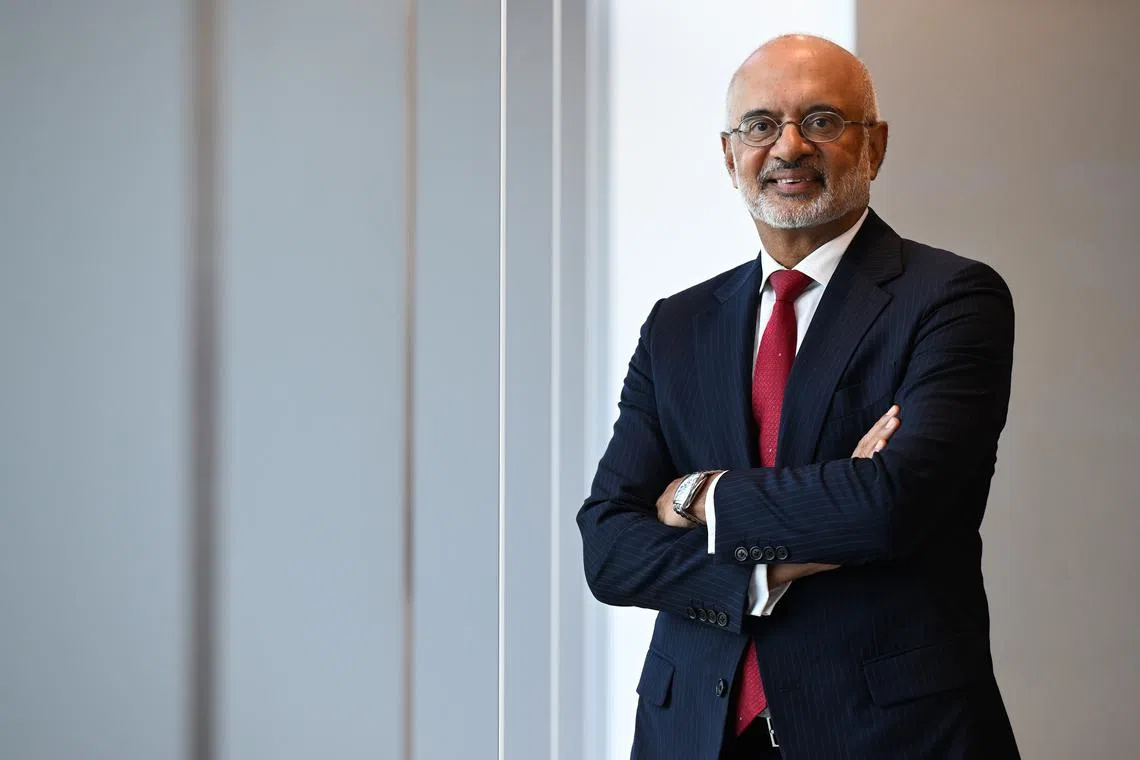SMU to expand footprint in South-east Asia with overseas centres
Sign up now: Get tips on how to help your child succeed

SMU chairman Piyush Gupta said on Thursday the goal is for SMU to stand out as a “quintessential Asian university”.
ST PHOTO: AZMI ATHNI
SINGAPORE - The Singapore Management University (SMU) wants to deepen its impact and growth in Asia, by setting up a network of centres in the region.
Starting with the first location in Jakarta, which opened in December 2022, these centres will serve as “embassies” for SMU to work with companies, universities and the wider society in those countries, as well as its students, to plug into the challenges and potential of the region.
Two more centres will open in 2023, one in Bangkok in October and the other in Ho Chi Minh City in November.
SMU chairman Piyush Gupta said on Thursday the goal is for SMU to stand out as a “quintessential Asian university”, as the global centre of gravity moves towards Asia.
“The world’s population is here, the world’s growth is here,” he said, adding that the Ministry of Education has selected SMU as the lead university to coordinate efforts in profiling Singapore’s autonomous universities in South-east Asia. These include coordinating internships in Indonesia.
The intention is to create a two-way flow of knowledge and opportunities for students from both sides, as well as to look for solutions that go beyond Singapore, said Mr Gupta, who took up his position at SMU in January this year. He is also the chief executive of DBS Bank.
Going forward, SMU will take on more applied research to address real-world problems, he said.
He was speaking to the media in an interview at SMU’s Bras Basah campus, outlining his vision for the university, and areas he hopes it will address.
“If you look at the rubric for universities in the last 100 years, it’s really been focused on basic research and academic citations. So how many journals can you publish in and how many citations do you get? That’s what defines success, both for the individual and for the school,” he said.
“It’s my view that as we think about the creation of knowledge to address the new problems in society, you’ve got to change the rubric a bit and start thinking about what I call applied research. So how do you actually create solutions for society?”
To this end, SMU will launch a new institute within the next six months dedicated to developing interdisciplinary research, with a focus on tackling social, management and technological challenges in urban solutions.
SMU has also appointed a new vice-provost for strategic research partnerships to drive external research tie-ups and work with faculty across the university.
Dr Cheong Wei Yang, who joined the university on Aug 1, will play a key role in drawing up research grant proposals aligned with national priorities.
Sixty per cent of his time will be at SMU, and the rest will be at the Ministry of Health, where he holds a concurrent appointment as senior adviser for health economics.
Mr Gupta said another area SMU will increasingly focus on is interdisciplinary learning. Its new College of Integrative Studies, which will start in August 2023 with its first intake of about 100 students, was eight times oversubscribed, he added.
Students in this college have the option to individualise their majors with a selection from across the university’s entire suite of about 1,000 courses.
Said Mr Gupta: “You’ve got to build a cadre of people who can connect the dots between the sciences and the liberal arts and the humanities… You need well-rounded people who can think broadly and laterally.”
The world’s big challenges – from climate change to the rise of artificial intelligence to changing geopolitics – will require civil society and businesses to step up, beyond governments, he added.
“Companies are not created just to maximise capital; companies are created because you can create an impact for people and improve outcomes,” he said. Similarly, universities need to evolve from being price-takers and just producing job-ready graduates to being pace-makers and shaping the world in a bigger way, said Mr Gupta.
Asked why he joined SMU, he said he had been looking for a platform for impact, and found in SMU the same defining characteristics as he did in Singapore and DBS.
“We’re big enough to have some heft, some resources and some clout, but we’re small enough to not be caught up with orthodoxies, so you can be nimble and adaptable and still can punch above your weight,” he said.



